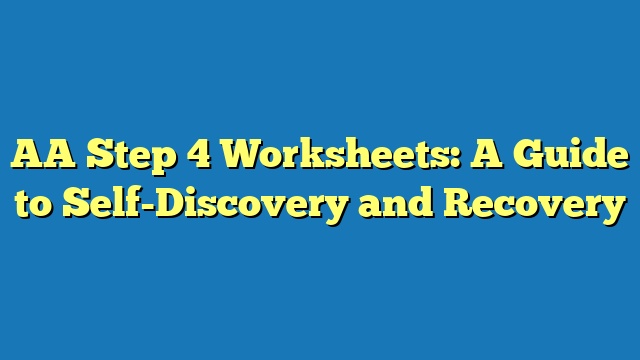AA Step 4 Worksheets are introspective tools used in the fourth step of the Alcoholics Anonymous (AA) program, which involves making a searching and fearless moral inventory. These worksheets provide a structured format for individuals to examine their past actions, thoughts, and behaviors, identifying their strengths, weaknesses, and areas for growth.
By completing AA Step 4 Worksheets, individuals can gain a deeper understanding of themselves, their motivations, and the impact of their actions on others. These worksheets have proven invaluable in helping individuals break free from the cycle of addiction and develop a more fulfilling and meaningful life. Historically, the development of AA Step 4 Worksheets is attributed to the early AA members, who recognized the need for a structured approach to self-examination.
This article will delve into the key components of AA Step 4 Worksheets, exploring their historical significance and practical applications in the recovery process.
AA Step 4 Worksheets
AA Step 4 Worksheets are essential for individuals seeking recovery from addiction through the Alcoholics Anonymous (AA) program. These worksheets guide participants through a profound process of self-examination, helping them understand their past actions, motivations, and impact on others.
- Introspection: Worksheets facilitate a deep dive into one’s thoughts, feelings, and behaviors.
- Self-Awareness: They promote a greater understanding of personal strengths, weaknesses, and patterns.
- Accountability: Worksheets encourage individuals to take ownership of their actions and choices.
- Honesty: They foster a commitment to being truthful with oneself and others.
- Growth: Worksheets provide a roadmap for personal development and positive change.
- Healing: They can help individuals heal from the wounds of the past and build a more fulfilling life.
- Connection: Worksheets can be used in group settings, fostering a sense of community and support.
- Recovery: Ultimately, AA Step 4 Worksheets are invaluable tools in the journey of recovery from addiction.
By engaging with the key aspects outlined above, individuals can gain a deeper understanding of themselves and their addiction, ultimately leading to a more successful recovery process. AA Step 4 Worksheets provide a structured and supportive framework for this crucial step in the AA program.
Introspection
Within the context of AA Step 4 Worksheets, introspection serves as a crucial element, enabling individuals to delve deeply into the intricacies of their inner selves. Through focused examination of thoughts, feelings, and behaviors, these worksheets guide participants toward a heightened level of self-awareness, laying the foundation for lasting recovery.
- Examining Motivations: Worksheets prompt individuals to explore the underlying reasons behind their actions, uncovering patterns and beliefs that may have contributed to addiction.
- Identifying Triggers: By reflecting on past experiences, participants can pinpoint specific situations or emotions that trigger addictive behaviors, empowering them to develop coping strategies.
- Understanding Consequences: Worksheets encourage individuals to assess the impact of their actions on themselves and others, fostering accountability and empathy.
- Cultivating Self-Compassion: Introspection allows individuals to recognize their own humanity, including both strengths and flaws, promoting self-acceptance and reducing shame.
Collectively, these facets of introspection empower individuals to gain a profound understanding of themselves, their addiction, and the path toward recovery. By facilitating a deep dive into one’s thoughts, feelings, and behaviors, AA Step 4 Worksheets provide a vital tool for personal growth, accountability, and lasting change.
Self-Awareness
Within the context of AA Step 4 Worksheets, self-awareness plays a pivotal role in fostering a deeper understanding of one’s personal strengths, weaknesses, and patterns. These worksheets guide individuals through a process of introspection, helping them uncover the underlying motivations, beliefs, and behaviors that have shaped their lives and contributed to their addiction.
Through self-awareness, individuals can gain valuable insights into their strengths, recognizing the positive qualities and resources they possess. This recognition can boost self-esteem and empower individuals to build upon their strengths as they navigate the recovery process. Conversely, understanding one’s weaknesses allows individuals to identify areas where growth is needed. By acknowledging their limitations, they can develop strategies to overcome challenges and prevent relapse.
Furthermore, AA Step 4 Worksheets encourage individuals to examine patterns in their lives, both positive and negative. Identifying patterns can help individuals recognize triggers, understand the consequences of their actions, and develop healthier coping mechanisms. By breaking free from destructive patterns and cultivating positive ones, individuals can create a more fulfilling and meaningful life in recovery.
In summary, self-awareness is a crucial component of AA Step 4 Worksheets, enabling individuals to gain a deeper understanding of themselves, their strengths and weaknesses, and the patterns that have shaped their lives. This understanding is essential for personal growth, accountability, and lasting recovery.
Accountability
Within the context of AA Step 4 Worksheets, accountability plays a crucial role in fostering personal growth and recovery. These worksheets guide individuals through a process of self-examination, encouraging them to take ownership of their actions and choices, both past and present.
Accountability is a critical component of AA Step 4 Worksheets as it helps individuals break free from the cycle of denial and self-blame that often accompanies addiction. By acknowledging their own responsibility for their actions, individuals can begin to make amends for past mistakes and take positive steps towards a healthier future. Real-life examples within AA Step 4 Worksheets may include participants admitting their role in broken relationships, financial difficulties, or legal consequences.
The practical applications of understanding accountability in AA Step 4 Worksheets are far-reaching. By taking ownership of their actions, individuals can develop a stronger sense of self-awareness and self-respect. They can also build healthier relationships, as they become more honest and trustworthy with others. Additionally, accountability can empower individuals to make more responsible choices in the future, reducing the risk of relapse and promoting long-term recovery.
In conclusion, accountability is a vital aspect of AA Step 4 Worksheets, enabling individuals to take responsibility for their actions, break free from denial, and build a more fulfilling life in recovery. By encouraging individuals to take ownership of their choices, AA Step 4 Worksheets provide a powerful tool for personal growth, accountability, and lasting change.
Honesty
Within the context of AA Step 4 Worksheets, honesty plays a pivotal role in fostering personal growth, accountability, and lasting recovery. These worksheets guide individuals through a process of self-examination, encouraging them to be truthful with themselves and others about their past actions, motivations, and impact on others.
- Self-Reflection: Worksheets promote honest introspection, challenging individuals to confront their true selves and acknowledge their strengths and weaknesses.
- Admission of Wrongdoing: Honesty requires individuals to admit their mistakes and take responsibility for their actions, breaking free from denial and self-deception.
- Amends and Reconciliation: Worksheets encourage individuals to make amends for past wrongs, fostering reconciliation with others and themselves.
- Building Trust: Honesty is essential for building trust in relationships, both with oneself and others, as it demonstrates integrity and reliability.
By fostering a commitment to honesty, AA Step 4 Worksheets empower individuals to break free from the cycle of addiction, build healthier relationships, and live more fulfilling lives. Honesty is a cornerstone of recovery, allowing individuals to confront their past, embrace their present, and forge a brighter future.
Growth
Within the context of AA Step 4 Worksheets, growth is a central theme, empowering individuals to embark on a journey of personal development and positive change. These worksheets serve as a roadmap, guiding individuals through a process of self-discovery and transformation.
- Self-Awareness: Worksheets promote a deeper understanding of oneself, including strengths, weaknesses, and motivations, fostering a foundation for growth.
- Accountability: By taking ownership of their actions and choices, individuals can identify areas for improvement and make amends, leading to personal growth and healthier relationships.
- Amends and Reconciliation: Worksheets encourage individuals to make amends for past wrongs, fostering reconciliation with others and themselves, promoting growth and healing.
- Building a Support System: Worksheets emphasize the importance of building a strong support system, connecting individuals with sponsors, mentors, and peers who can provide encouragement and guidance, facilitating growth and recovery.
Overall, AA Step 4 Worksheets provide a comprehensive roadmap for personal development and positive change. By fostering self-awareness, accountability, amends, and support, these worksheets empower individuals to break free from the cycle of addiction and embrace a brighter future.
Healing
Within the context of AA Step 4 Worksheets, healing plays a pivotal role in enabling individuals to break free from the cycle of addiction and embrace personal growth. These worksheets provide a structured process for individuals to confront their past actions, motivations, and impact on others, ultimately leading to healing and a more fulfilling life.
- Emotional Healing: AA Step 4 Worksheets facilitate the exploration and release of pent-up emotions, allowing individuals to process and heal from past traumas and experiences.
- Spiritual Healing: The worksheets encourage individuals to connect with a higher power or their own inner spirituality, fostering a sense of purpose and meaning in recovery.
- Relational Healing: By promoting honesty and accountability, AA Step 4 Worksheets help individuals mend broken relationships and build healthier connections with others.
- Physical Healing: While not a direct focus, healing from addiction often leads to improved physical health and well-being, as individuals adopt healthier lifestyle choices and engage in self-care.
Through these multifaceted aspects of healing, AA Step 4 Worksheets empower individuals to break free from the chains of addiction, build a strong foundation for recovery, and rediscover the joy and purpose in life.
Connection
Within the context of AA Step 4 Worksheets, the aspect of connection plays a crucial role in fostering a sense of community and support, which is essential for recovery. Group settings provide a safe and supportive environment where individuals can share their experiences, offer encouragement, and learn from one another.
- Shared Experiences: Group settings bring together individuals who have similar experiences with addiction, creating a sense of camaraderie and understanding.
- Peer Support: Participants can offer each other emotional support, encouragement, and practical advice, reducing feelings of isolation and shame.
- Accountability and Motivation: Group members can hold one another accountable for their actions and provide motivation to stay on track with recovery.
- Social Skills Development: Group participation helps individuals develop social skills, such as communication, empathy, and conflict resolution, which are essential for maintaining healthy relationships.
The sense of community and support fostered through group settings is a vital component of AA Step 4 Worksheets. By connecting with others who are also on the path of recovery, individuals can break free from the isolation of addiction and build a strong foundation for lasting change.
Recovery
AA Step 4 Worksheets serve as a vital component of addiction recovery, providing individuals with a structured and introspective process to examine their past actions, motivations, and impact on others. This self-examination plays a crucial role in promoting recovery by fostering self-awareness, accountability, and personal growth, ultimately leading to lasting change.
Recovery from addiction is a complex and challenging journey, and AA Step 4 Worksheets provide a roadmap for individuals to navigate this path. By confronting their past and taking ownership of their actions, individuals can break free from the cycle of denial and self-blame that often accompanies addiction. This process of self-discovery and accountability empowers individuals to make amends for past mistakes, build healthier relationships, and develop coping mechanisms to prevent relapse.
Real-life examples of the practical applications of AA Step 4 Worksheets abound. Individuals who have completed these worksheets often report a profound shift in their understanding of themselves and their addiction. They gain a deeper appreciation for their strengths and weaknesses, and they develop a renewed sense of purpose and direction in life. By working through the worksheets with the support of a sponsor or therapist, individuals can uncover hidden patterns and triggers that have contributed to their addiction, empowering them to make lasting changes in their lives.
In conclusion, AA Step 4 Worksheets are invaluable tools for individuals seeking recovery from addiction. By providing a structured process for self-examination, these worksheets promote self-awareness, accountability, and personal growth, ultimately leading to lasting change and a more fulfilling life.
AA Step 4 Worksheets FAQs
This section provides answers to frequently asked questions about AA Step 4 Worksheets, addressing common concerns and clarifying their purpose and benefits.
Question 1: What is the purpose of AA Step 4 Worksheets?
AA Step 4 Worksheets guide individuals through a structured self-examination process, helping them understand their past actions, motivations, and impact on others, as part of the fourth step in the Alcoholics Anonymous (AA) program.
Question 2: Who should use AA Step 4 Worksheets?
These worksheets are primarily intended for individuals participating in the AA program who are seeking recovery from addiction. They provide a framework for deep introspection and personal growth.
Question 3: How do I use AA Step 4 Worksheets?
Ideally, individuals should work through the worksheets with the support of a sponsor or therapist. The worksheets involve writing and reflecting on one’s past actions and motivations, promoting self-awareness and accountability.
Question 4: What are the benefits of using AA Step 4 Worksheets?
Completing these worksheets can lead to increased self-awareness, a deeper understanding of addiction, improved relationships, and a stronger foundation for lasting recovery.
Question 5: Can I complete AA Step 4 Worksheets on my own?
While it is possible to work through the worksheets independently, it is highly recommended to have the guidance of a sponsor or therapist to provide support, feedback, and accountability.
Question 6: How long does it take to complete AA Step 4 Worksheets?
The time it takes to complete the worksheets can vary depending on the individual’s pace and level of self-reflection. It is important to approach the process with patience and thoroughness.
In summary, AA Step 4 Worksheets offer a valuable tool for individuals seeking recovery from addiction. By promoting self-awareness, accountability, and personal growth, these worksheets contribute to a deeper understanding of oneself and one’s addiction, ultimately supporting the journey toward lasting recovery.
The next section will delve into practical tips for completing AA Step 4 Worksheets effectively, providing guidance on how to approach the process and maximize its benefits.
AA Step 4 Worksheets
To effectively complete AA Step 4 Worksheets and maximize their benefits, consider the following practical tips:
Tip 1: Seek Guidance: Work through the worksheets with the support of a sponsor or therapist for guidance, feedback, and accountability.
Tip 2: Be Honest and Thorough: Approach the worksheets with honesty and thoroughness, reflecting deeply on your past actions and motivations.
Tip 3: Break Down the Process: Divide the worksheets into smaller sections to make the task less daunting and more manageable.
Tip 4: Use Specific Examples: Provide specific examples from your life to illustrate your actions and motivations, enhancing self-awareness.
Tip 5: Identify Patterns: Pay attention to recurring patterns in your behavior, thoughts, and emotions to gain insights into your addiction.
Tip 6: Focus on Growth: Use the worksheets as an opportunity for personal growth and development rather than solely focusing on past mistakes.
Tip 7: Be Patient: The process of completing AA Step 4 Worksheets can be challenging, so approach it with patience and self-compassion.
By following these tips, you can effectively utilize AA Step 4 Worksheets to gain a deeper understanding of yourself, your addiction, and the path toward lasting recovery.
The insights and self-awareness gained from completing the worksheets will serve as a solid foundation as you progress in your recovery journey.
Conclusion
AA Step 4 Worksheets play a pivotal role in the recovery process, providing a structured framework for self-examination and personal growth. Through introspection, individuals gain a deeper understanding of their past actions, motivations, and impact on others, fostering accountability and honesty.
Key points highlighted throughout the article include the promotion of self-awareness, the encouragement of accountability, and the facilitation of healing and growth. These elements are interconnected, as self-awareness leads to accountability, which in turn creates opportunities for healing and personal development.
Embracing the process of completing AA Step 4 Worksheets empowers individuals to break free from the cycle of addiction, build stronger relationships, and live more fulfilling lives. These worksheets serve as a valuable tool for anyone seeking lasting recovery from addiction.









Tips for Using "Template by Kevin Crafts" Comments for Meaningful Online Discussions